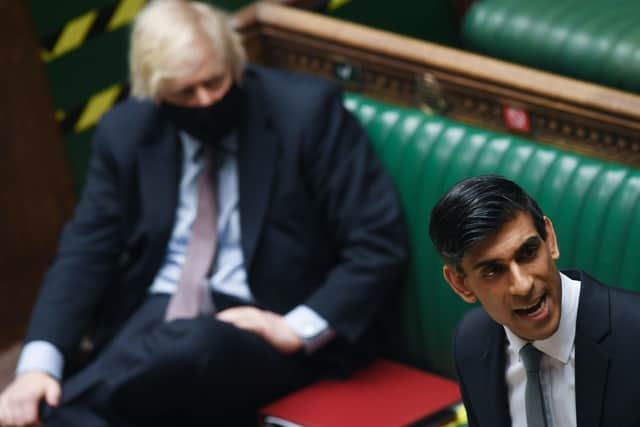How Boris Johnson can go back to the future to make levelling up work: Ryan Shorthouse
THE Government is desperate to get past the pandemic and focus on ‘levelling up’ – a convoluted term for improving life for more deprived people and areas in the UK. Boris Johnson has been advised by those close to him to stop using it. But, whatever it is called, he obviously
should not abandon the mission.
In truth, though, this is not a new agenda. David Cameron talked about improving life chances. Theresa May wanted to tackle burning injustices.


Advertisement
Hide AdAdvertisement
Hide AdMeanwhile Boris Johnson is simply rebadging the social reform agenda One Nation Conservatives have urged to be central to policy since Margaret Thatcher’s era to convince voters they are more than just a party of economic prudence, but of really caring about and helping those just about managing, or even not at all.
The vagueness of these slogans allows all sorts of people to stick their hobby horses to them. So it is
with levelling up. The list of what it means is long: improving transport connectivity between different regions, rebuilding social capital in so-called left-behind towns, encouraging investment and economic activity in old industrial and coastal communities, as well as boosting the incomes of the poorest.
All laudable aims. In essence, what governments of all stripes should be doing. There is a bit of a twist on the theme though. This Conservative government want to particularly thank and transform the lives of those Brexit-voting folk in so-called ‘red wall’ seats in the North and Wales who gave them a stonking majority just over a year ago.


Advertisement
Hide AdAdvertisement
Hide AdWe were told by Theresa Ma that these people voted to leave the EU in 2016 because of something broader: “A sense – deep, profound and let’s face it often justified – that many people have today that the world works well for a privileged few, but not for them.”
There’s been lots of quite dramatic interpretation of that narrow referendum result – as with the election of President Donald Trump. It represented some populist surge, apparently. Joe Biden’s victory, the archetypal establishment centrist, seems to have given that short shrift.
The securer explanation for Brexit – albeit more boring – is that more people in this country simply thought, on balance, that we were better off out than in the EU, a Euroscepticism that has been simmering for some decades.
Then, fatigue with the Brexit shenanigans led even those scarred from deindustrialisation decades earlier to vote Tory to ‘Get Brexit Done’. It would be stretching it, to say the least, to argue these voters thought Boris Johnson could truly transform their circumstances. But, to keep them on side, he ought to well try.
Advertisement
Hide AdAdvertisement
Hide AdThe Levelling Up Fund, announced at the Spending Review late last year, is a start. But it follows countless initiatives since the 1960s to regenerate deprived areas.
Clearly, insufficient progress is not through want of trying. Now its back to the future: the Single Regeneration Budget, launched by the Conservative Government in the early 1990s, provides the model for the Levelling Up Fund, inviting local organisations to partner up to bid for grants.
The evidence suggests that area-based regeneration initiatives can be effective, but only marginally and if supported over a long timeframe. Really, it’s the level of both public and private sector expenditure that really determine the destiny of these places, especially employment levels. So strong incentives are needed to convince businesses to locate and invest there.
Keeping and attracting motivated people matters, deep down, the most. Often referred to as highly-skilled, their educational credentials are often a product of drive and discipline above anything else. What they do is create, build, lead enterprises, commercial and social, that can make such a difference. Thriving companies attract talented people, but also vice-versa, as economists have found.
Advertisement
Hide AdAdvertisement
Hide AdLeft-behind areas are leaky, with the zestful looking for – often encouraged – to move further afield, understandably. Policymakers ought to think about what can pull them back – the tax advantages, the preferential access to grants and finance, the cultural amenities, the quick connections to big cities, the cheaper property in a world of increased remote working, even the reputational rewards. If this Government wants to level up, it needs the upwardly mobile to turn around.
Ryan Shorthouse is chief executive of Bright Blue, an independent think tank and pressure group for liberal conservatism.
Support The Yorkshire Post and become a subscriber today. Your subscription will help us to continue to bring quality news to the people of Yorkshire. In return, you’ll see fewer ads on site, get free access to our app and receive exclusive members-only offers. Click here to subscribe.
Comment Guidelines
National World encourages reader discussion on our stories. User feedback, insights and back-and-forth exchanges add a rich layer of context to reporting. Please review our Community Guidelines before commenting.